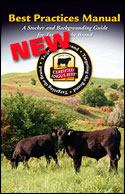Wet Weather May Lead to Unexpected Disease
Standing water may further the spread of Lepto hardjo-bovis.
After flooding and wet weather in some parts of the country, producers are anxiously looking forward to a drier fall. However, standing water may cause more than just a logistical headache for producers. The excess moisture also may help further the spread of the Lepto hardjo-bovis organism, robbing cattle of reproductive performance and producers of profitability.
Lepto hardjo-bovis is transmitted through membranes of the eyes, nose, mouth and even the skin when uninfected animals come in contact with urine of infected animals directly, or contaminated water.
Perhaps more alarming, says Jon Seeger, Veterinary Operations, Pfizer Animal Health, is that many producers may not realize their herds may be infected with Lepto hardjo-bovis, especially if the disease has been established for a long period of time.
"A common clinical sign of Lepto hardjo-bovis is embryonic loss, so producers may think their cattle just aren't settling," Seeger says. "However, if Lepto hardjo-bovis is to blame, producers may notice lower pregnancy rates, fetal loss and general reproduction problems. The bottom line is Lepto hardjo-bovis causes more open cows — they may breed eventually, but they'll be a cycle or two behind."
Even though producers may not perceive Lepto hardjo-bovis as a problem on their operations, research has shown that 42% of tested herds were infected.
To help keep the disease from depriving cattle of their reproductive performance — and cheating producers out of profits — Seeger recommends producers talk to their veterinarians to find the right reproductive vaccine to combat Lepto hardjo-bovis.
"Producers should start by talking to their veterinarians," Seeger says. "Then, together they can evaluate the herd's needs to decide what will work best for their individual operation."
Additionally, Seeger advises producers to look for a complete reproductive vaccine that helps provide protection against Lepto hardjo-bovis, plus five major viral pathogens, and has duration of immunity label claims, such as Bovi-Shield GOLD FP® 5 L5 HB.
 Part of a comprehensive line of reproductive vaccines, Bovi-Shield GOLD FP 5 L5 HB helps provide protection against infectious bovine rhinotracheitis (IBR) virus, parainfluenza type 3 (PI3) virus, bovine respiratory syncytial virus (BRSV) and bovine viral diarrhea (BVD) virus Types 1 and 2. It offers at least 365 days of protection from IBR abortions, BVD Types 1 and 2 persistent infection, Lepto hardjo-bovis infection, and Lepto hardjo-bovis urinary shedding and kidney colonization.
Part of a comprehensive line of reproductive vaccines, Bovi-Shield GOLD FP 5 L5 HB helps provide protection against infectious bovine rhinotracheitis (IBR) virus, parainfluenza type 3 (PI3) virus, bovine respiratory syncytial virus (BRSV) and bovine viral diarrhea (BVD) virus Types 1 and 2. It offers at least 365 days of protection from IBR abortions, BVD Types 1 and 2 persistent infection, Lepto hardjo-bovis infection, and Lepto hardjo-bovis urinary shedding and kidney colonization.
"Extra moisture from a wet spring and summer may bring an added risk of Lepto hardjo-bovis infections, so producers need to take reproductive protection to the next level," Seeger says.
[Click here to go to the top of the page.]









